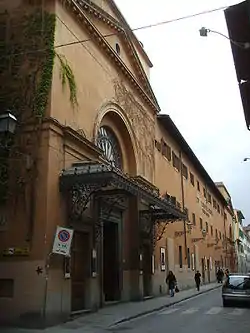Antonio Salvi
Antonio Salvi (17 January 1664 – 21 May 1724) was an Italian physician, court poet and librettist, active mainly in Florence, Italy. He was in the service of the grand-ducal court of Tuscany and the favourite librettist of Prince Ferdinando de' Medici. Salvi was one of the developers of the opera seria.

Life
Salvi was born in Lucignano and became a court physician in Florence for the Medici family. From 1694 (?) he wrote libretti for the theatre in Livorno and Florence and adapted works by Jean Racine[1] and Molière.;[2] Salvi took many of his plots from French tragedy.[3] Between 1701 and 1710 seven of his works were performed in the Villa di Pratolino. After the death of Ferdinando (III) de' Medici in 1713 he decided to work outside the Grand Duchy of Tuscany: in Rome, Reggio Emilia, Turin, Venice and Munich. His libretti were set to music by several famous composers including Scarlatti, Vivaldi and Handel. He died in Florence, aged 60.
Vivaldi wrote three operas for Florence to texts by Antonio Salvi. All were produced at the Teatro della Pergola.
Works
- Astianatte (1701),[4] based on Andromaque by Jean Racine, set to music by Giacomo Antonio Perti, Antonio Maria Bononcini, Francesco Gasparini, Vinci, Giovanni Bononcini and Niccolò Jommelli
- Arminio (1703),[5] set to music by Alessandro Scarlatti, Antonio Caldara, Carlo Francesco Pollarolo, Johann Adolph Hasse, Georg Friedrich Handel and Baldassare Galuppi
- Dionisio Re di Portogallo (1707), set to music by Georg Friedrich Handel as Sosarme
- Ginevra Principessa di Scozia (1708), set to music by Giacomo Antonio Perti and Antonio Vivaldi; as Ariodante set to music by Carlo Francesco Pollarolo, Georg Friedrich Handel and Georg Christoph Wagenseil
- Berenice (1709), set to music by Georg Friedrich Handel
- Rodelinda Regina de' Longobardi (1710), set to music by Giacomo Antonio Perti, Georg Friedrich Handel[6] and Carl Heinrich Graun
- Lucio Papirio (1714), set to music by Francesco Gasparini, Luca Antonio Predieri, Leonardo Leo and Nicola Antonio Porpora
- Il pazzo per politica (1717), set to music by Luca Antonio Predieri und Tomaso Albinoni (as Eumene)
- Scanderbeg (1718), set to music by Antonio Vivaldi
- Adelaide (1722), set to music by Pietro Torri, Nicola Antonio Porpora, Georg Friedrich Handel (as Lotario), Giuseppe Maria Orlandini and Antonio Vivaldi.
Sources
- Essays on Handel and Italian opera By Reinhard Strohm
- The operas of Leonardo Vinci, Napoletano By Kurt Sven Markstrom
- Dean, W. (1995) Handel's Operas 1704-1726, p. 86.
- The operas of Leonardo Vinci, Napoletano By Kurt Sven Markstrom
- Polymath of the baroque: Agostino Steffani and his music By Colin Timms
- Essays on Handel and Italian opera By Reinhard Strohm